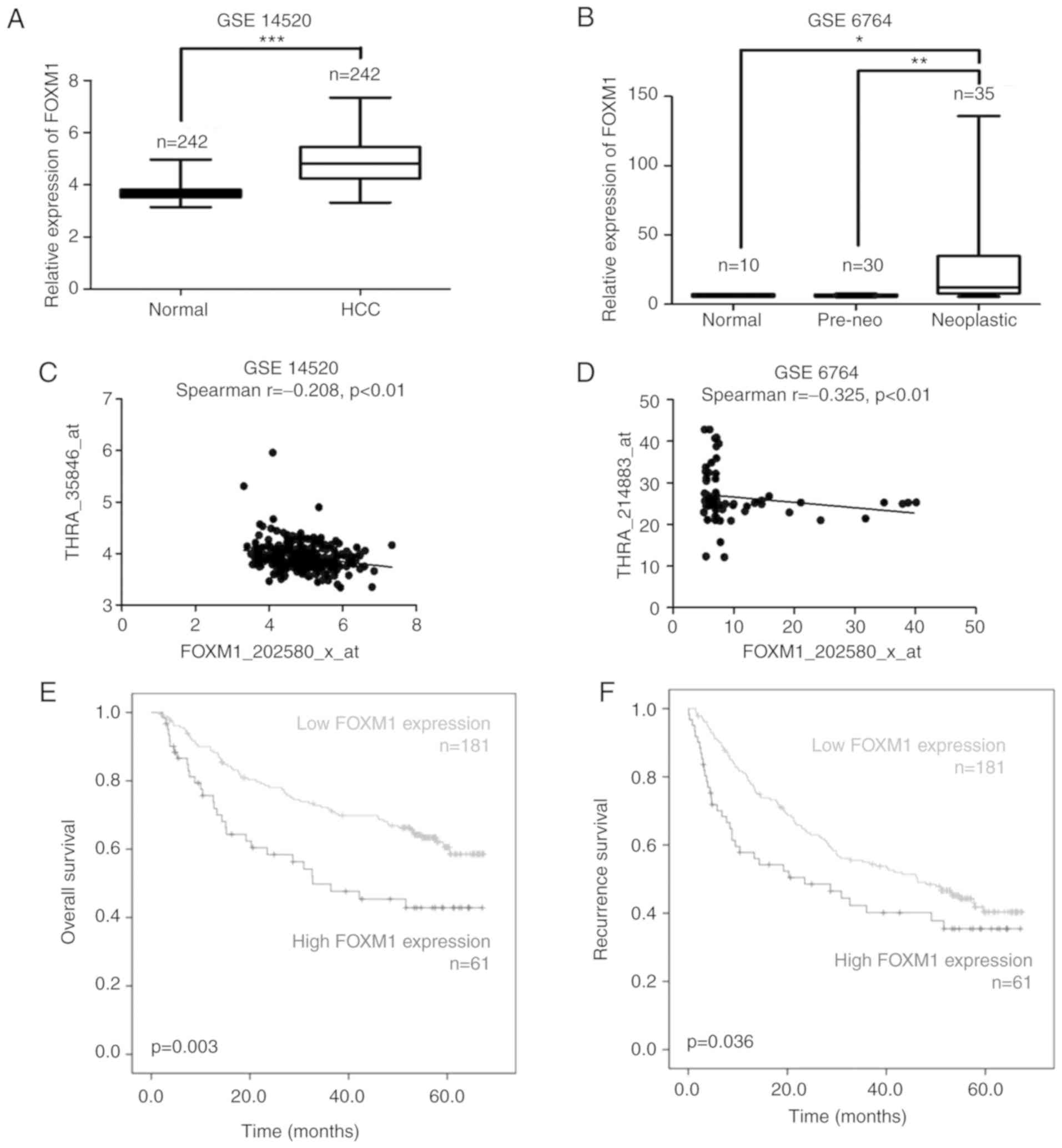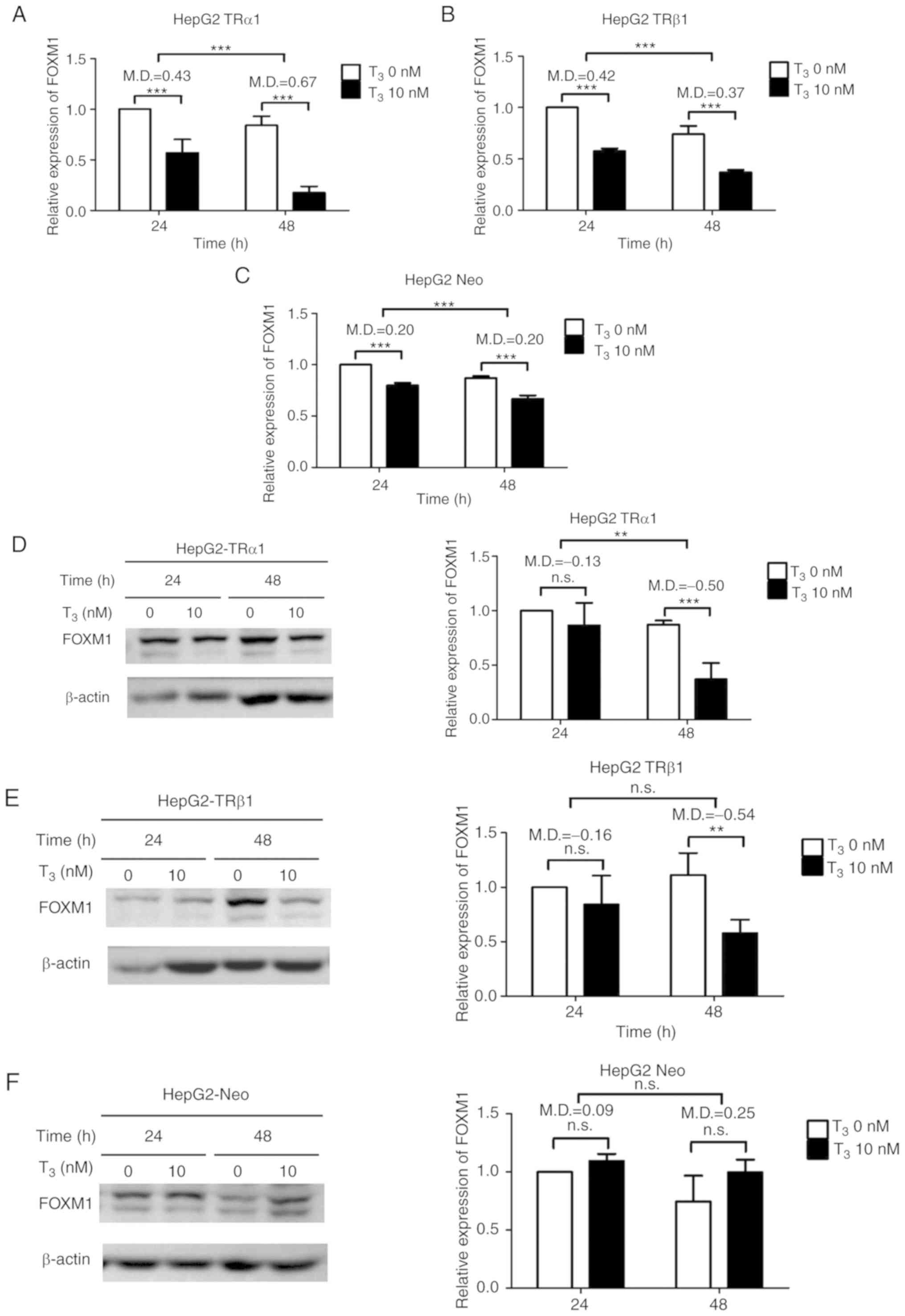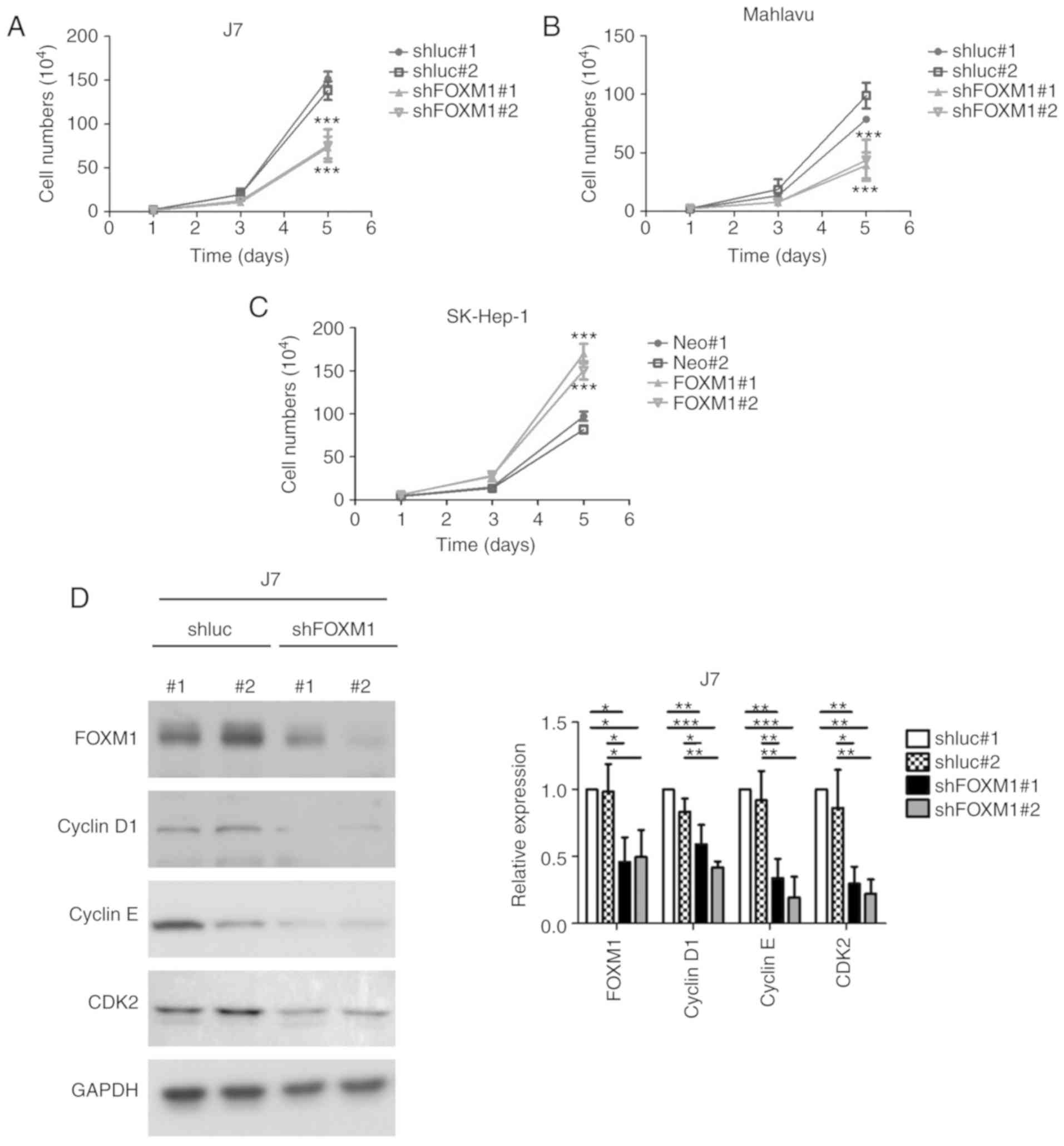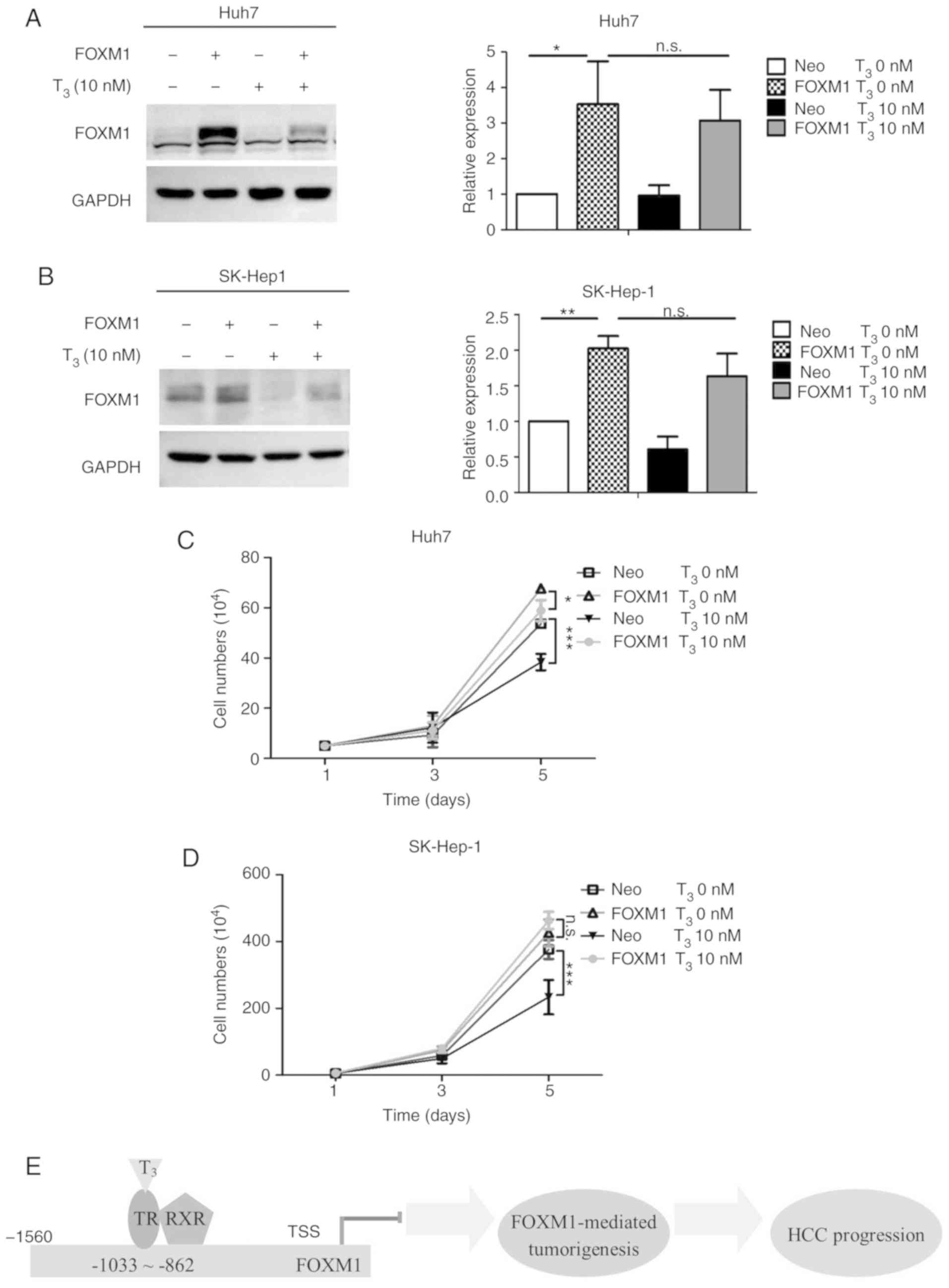|
1
|
Wu SM, Cheng WL, Lin CD and Lin KH:
Thyroid hormone actions in liver cancer. Cell Mol Life Sci.
70:1915–1936. 2013. View Article : Google Scholar : PubMed/NCBI
|
|
2
|
Chi HC, Chen CY, Tsai MM, Tsai CY and Lin
KH: Molecular functions of thyroid hormones and their clinical
significance in liver-related diseases. Biomed Res Int.
2013:6013612013. View Article : Google Scholar : PubMed/NCBI
|
|
3
|
Liu YC, Yeh CT and Lin KH: Molecular
functions of thyroid hormone signaling in regulation of cancer
progression and anti-apoptosis. Int J Mol Sci. 20:49862019.
View Article : Google Scholar
|
|
4
|
Sap J, Muñoz A, Damm K, Goldberg Y,
Ghysdael J, Leutz A, Beug H and Vennström B: The c-erb-A protein is
a high-affinity receptor for thyroid hormone. Nature. 324:635–640.
1986. View
Article : Google Scholar : PubMed/NCBI
|
|
5
|
Weinberger C, Thompson CC, Ong ES, Lebo R,
Gruol DJ and Evans RM: The c-erb-A gene encodes a thyroid hormone
receptor. Nature. 324:641–646. 1986. View
Article : Google Scholar : PubMed/NCBI
|
|
6
|
Hammes SR and Davis PJ: Overlapping
nongenomic and genomic actions of thyroid hormone and steroids.
Best Pract Res Clin Endocrinol Metab. 29:581–593. 2015. View Article : Google Scholar : PubMed/NCBI
|
|
7
|
Davis PJ, Glinsky GV, Lin HY and Mousa SA:
Actions of thyroid hormone analogues on chemokines. J Immunol Res.
2016:31476712016. View Article : Google Scholar : PubMed/NCBI
|
|
8
|
Huang PS, Wang CS, Yeh CT and Lin KH:
Roles of thyroid hormone-associated microRNAs affecting oxidative
stress in human hepatocellular carcinoma. Int J Mol Sci.
20:52202019. View Article : Google Scholar
|
|
9
|
Davis PJ, Leonard JL, Lin HY, Leinung M
and Mousa SA: Molecular basis of nongenomic actions of thyroid
hormone. Vitam Horm. 106:67–96. 2018. View Article : Google Scholar : PubMed/NCBI
|
|
10
|
Iwasaki Y, Sunaga N, Tomizawa Y, Imai H,
Iijima H, Yanagitani N, Horiguchi K, Yamada M and Mori M:
Epigenetic inactivation of the thyroid hormone receptor beta1 gene
at 3p24.2 in lung cancer. Ann Surg Oncol. 17:2222–2228. 2010.
View Article : Google Scholar : PubMed/NCBI
|
|
11
|
Liu R, Li Z, Bai S, Zhang H, Tang M, Lei
Y, Chen L, Liang S, Zhao YL, Wei Y and Huang C: Mechanism of cancer
cell adaptation to metabolic stress: Proteomics identification of a
novel thyroid hormone-mediated gastric carcinogenic signaling
pathway. Mol Cell Proteomics. 8:70–85. 2009. View Article : Google Scholar : PubMed/NCBI
|
|
12
|
Brown AR, Simmen RC and Simmen FA: The
role of thyroid hormone signaling in the prevention of digestive
system cancers. Int J Mol Sci. 14:16240–16257. 2013. View Article : Google Scholar : PubMed/NCBI
|
|
13
|
Davis PJ, Lin HY, Hercbergs AA, Keating KA
and Mousa SA: How thyroid hormone works depends upon cell type,
receptor type, and hormone analogue: Implications in cancer growth.
Discov Med. 27:111–117. 2019.PubMed/NCBI
|
|
14
|
Davis PJ, Sudha T, Lin HY and Mousa SA:
Thyroid hormone, hormone analogs, and angiogenesis. Compr Physiol.
6:353–362. 2015. View Article : Google Scholar : PubMed/NCBI
|
|
15
|
Cicatiello AG, Ambrosio R and Dentice M:
Thyroid hormone promotes differentiation of colon cancer stem
cells. Mol Cell Endocrinol. 459:84–89. 2017. View Article : Google Scholar : PubMed/NCBI
|
|
16
|
Lin HY, Chin YT, Yang YC, Lai HY,
Wang-Peng J, Liu LF, Tang HY and Davis PJ: Thyroid hormone, cancer,
and apoptosis. Compr Physiol. 6:1221–1237. 2016. View Article : Google Scholar : PubMed/NCBI
|
|
17
|
Rostkowska O, Spychalski P, Dobrzycka M,
Wilczyński M, Łachiński AJ, Obołończyk Ł, Sworczak K and Kobiela J:
Effects of thyroid hormone imbalance on colorectal cancer
carcinogenesis and risk-a systematic review. Endokrynol Pol.
70:190–197. 2019. View Article : Google Scholar : PubMed/NCBI
|
|
18
|
Hercbergs A, Mousa SA, Leinung M, Lin HY
and Davis PJ: Thyroid hormone in the clinic and breast cancer. Horm
Cancer. 9:139–143. 2018. View Article : Google Scholar : PubMed/NCBI
|
|
19
|
Lin YH, Wu MH, Liao CJ, Huang YH, Chi HC,
Wu SM, Chen CY, Tseng YH, Tsai CY, Chung IH, et al: Repression of
microRNA-130b by thyroid hormone enhances cell motility. J Hepatol.
62:1328–1340. 2015. View Article : Google Scholar : PubMed/NCBI
|
|
20
|
Chi HC, Chen SL, Tsai CY, Chuang WY, Huang
YH, Tsai MM, Wu SM, Sun CP, Yeh CT and Lin KH: Thyroid hormone
suppresses hepatocarcinogenesis via DAPK2 and SQSTM1-dependent
selective autophagy. Autophagy. 12:2271–2285. 2016. View Article : Google Scholar : PubMed/NCBI
|
|
21
|
Tseng YH, Huang YH, Lin TK, Wu SM, Chi HC,
Tsai CY, Tsai MM, Lin YH, Chang WC, Chang YT, et al: Thyroid
hormone suppresses expression of stathmin and associated tumor
growth in hepatocellular carcinoma. Sci Rep. 6:387562016.
View Article : Google Scholar : PubMed/NCBI
|
|
22
|
Chi HC, Chen SL, Lin SL, Tsai CY, Chuang
WY, Lin YH, Huang YH, Tsai MM, Yeh CT and Lin KH: Thyroid hormone
protects hepatocytes from HBx-induced carcinogenesis by enhancing
mitochondrial turnover. Oncogene. 36:5274–5284. 2017. View Article : Google Scholar : PubMed/NCBI
|
|
23
|
Puliga E, Min Q, Tao J, Zhang R,
Pradhan-Sundd T, Poddar M, Singh S, Columbano A, Yu J and Monga SP:
Thyroid hormone receptor-β agonist GC-1 inhibits
met-β-catenin-driven hepatocellular cancer. Am J Pathol.
187:2473–2485. 2017. View Article : Google Scholar : PubMed/NCBI
|
|
24
|
Huang PS, Lin YH, Chi HC, Chen PY, Huang
YH, Yeh CT, Wang CS and Lin KH: Thyroid hormone inhibits growth of
hepatoma cells through induction of miR-214. Sci Rep. 7:148682017.
View Article : Google Scholar : PubMed/NCBI
|
|
25
|
Lin YH, Wu MH, Huang YH, Yeh CT, Chi HC,
Tsai CY, Chuang WY, Yu CJ, Chung IH, Chen CY and Lin KH: Thyroid
hormone negatively regulates tumorigenesis through suppression of
BC200. Endocr Relat Cancer. 25:967–979. 2018. View Article : Google Scholar : PubMed/NCBI
|
|
26
|
Chen CY, Wu SM, Lin YH, Chi HC, Lin SL,
Yeh CT, Chuang WY and Lin KH: Induction of nuclear protein-1 by
thyroid hormone enhances platelet-derived growth factor A mediated
angiogenesis in liver cancer. Theranostics. 9:2361–2379. 2019.
View Article : Google Scholar : PubMed/NCBI
|
|
27
|
Kowalik MA, Puliga E, Cabras L, Sulas P,
Petrelli A, Perra A, Ledda-Columbano GM, Morandi A, Merlin S, Orrù
C, et al: Thyroid hormone inhibits hepatocellular carcinoma
progression via induction of differentiation and metabolic
reprogramming. J Hepatol. 72:1159–1169. 2020. View Article : Google Scholar : PubMed/NCBI
|
|
28
|
Chi HC, Tsai CY, Tsai MM, Yeh CT and Lin
KH: Molecular functions and clinical impact of thyroid
hormone-triggered autophagy in liver-related diseases. J Biomed
Sci. 26:242019. View Article : Google Scholar : PubMed/NCBI
|
|
29
|
Jemal A, Bray F, Center MM, Ferlay J, Ward
E and Forman D: Global cancer statistics. CA Cancer J Clin.
61:69–90. 2011. View Article : Google Scholar : PubMed/NCBI
|
|
30
|
El-Serag HB and Rudolph KL: Hepatocellular
carcinoma: Epidemiology and molecular carcinogenesis.
Gastroenterology. 132:2557–2576. 2007. View Article : Google Scholar : PubMed/NCBI
|
|
31
|
Barlow C, Meister B, Lardelli M, Lendahl U
and Vennström B: Thyroid abnormalities and hepatocellular carcinoma
in mice transgenic for v-erbA. EMBO J. 13:4241–4250. 1994.
View Article : Google Scholar : PubMed/NCBI
|
|
32
|
Chan IH and Privalsky ML: Thyroid hormone
receptors mutated in liver cancer function as distorted antimorphs.
Oncogene. 25:3576–3588. 2006. View Article : Google Scholar : PubMed/NCBI
|
|
33
|
Chan IH and Privalsky ML: Thyroid hormone
receptor mutants implicated in human hepatocellular carcinoma
display an altered target gene repertoire. Oncogene. 28:4162–4174.
2009. View Article : Google Scholar : PubMed/NCBI
|
|
34
|
Lin KH, Shieh HY, Chen SL and Hsu HC:
Expression of mutant thyroid hormone nuclear receptors in human
hepatocellular carcinoma cells. Mol Carcinog. 26:53–61. 1999.
View Article : Google Scholar : PubMed/NCBI
|
|
35
|
Lin KH, Wu YH and Chen SL: Impaired
interaction of mutant thyroid hormone receptors associated with
human hepatocellular carcinoma with transcriptional coregulators.
Endocrinology. 142:653–662. 2001. View Article : Google Scholar : PubMed/NCBI
|
|
36
|
Lin KH, Zhu XG, Shieh HY, Hsu HC, Chen ST,
McPhie P and Cheng SY: Identification of naturally occurring
dominant negative mutants of thyroid hormone alpha 1 and beta 1
receptors in a human hepatocellular carcinoma cell line.
Endocrinology. 137:4073–4081. 1996. View Article : Google Scholar : PubMed/NCBI
|
|
37
|
Koo CY, Muir KW and Lam EW: FOXM1: From
cancer initiation to progression and treatment. Biochim Biophys
Acta. 1819:28–37. 2012. View Article : Google Scholar : PubMed/NCBI
|
|
38
|
Lam EW, Brosens JJ, Gomes AR and Koo CY:
Forkhead box proteins: Tuning forks for transcriptional harmony.
Nat Rev Cancer. 13:482–495. 2013. View Article : Google Scholar : PubMed/NCBI
|
|
39
|
Kalinichenko VV, Major ML, Wang X,
Petrovic V, Kuechle J, Yoder HM, Dennewitz MB, Shin B, Datta A,
Raychaudhuri P and Costa RH: Foxm1b transcription factor is
essential for development of hepatocellular carcinomas and is
negatively regulated by the p19ARF tumor suppressor. Genes Dev.
18:830–850. 2004. View Article : Google Scholar : PubMed/NCBI
|
|
40
|
Shih CH, Chen SL, Yen CC, Huang YH, Chen
CD, Lee YS and Lin KH: Thyroid hormone receptor-dependent
transcriptional regulation of fibrinogen and coagulation proteins.
Endocrinology. 145:2804–2814. 2004. View Article : Google Scholar : PubMed/NCBI
|
|
41
|
Bella L, Zona S, Nestal de Moraes G and
Lam EW: FOXM1: A key oncofoetal transcription factor in health and
disease. Semin Cancer Biol. 29:32–39. 2014. View Article : Google Scholar : PubMed/NCBI
|
|
42
|
Park HJ, Gusarova G, Wang Z, Carr JR, Li
J, Kim KH, Qiu J, Park YD, Williamson PR, Hay N, et al:
Deregulation of FoxM1b leads to tumour metastasis. EMBO Mol Med.
3:21–34. 2011. View Article : Google Scholar : PubMed/NCBI
|
|
43
|
Nandi D, Cheema PS, Jaiswal N and Nag A:
FoxM1: Repurposing an oncogene as a biomarker. Semin Cancer Biol.
52:74–84. 2018. View Article : Google Scholar : PubMed/NCBI
|
|
44
|
Shiu TY, Huang TY, Huang SM, Shih YL, Chu
HC, Chang WK and Hsieh TY: Nuclear factor κB down-regulates human
UDP-glucuronosyltransferase 1A1: A novel mechanism involved in
inflammation-associated hyperbilirubinaemia. Biochem J.
449:761–770. 2013. View Article : Google Scholar : PubMed/NCBI
|
|
45
|
Chen CJ, Tsai NM, Liu YC, Ho LI, Hsieh HF,
Yen CY and Harn HJ: Telomerase activity in human hepatocellular
carcinoma: Parallel correlation with human telomerase reverse
transcriptase (hTERT) mRNA isoform expression but not with cell
cycle modulators or c-Myc expression. Eur J Surg Oncol. 28:225–234.
2002. View Article : Google Scholar : PubMed/NCBI
|
|
46
|
Wu SM, Cheng WL, Liao CJ, Chi HC, Lin YH,
Tseng YH, Tsai CY, Chen CY, Lin SL, Chen WJ, et al: Negative
modulation of the epigenetic regulator, UHRF1, by thyroid hormone
receptors suppresses liver cancer cell growth. Int J Cancer.
137:37–49. 2015. View Article : Google Scholar : PubMed/NCBI
|
|
47
|
Livak KJ and Schmittgen TD: Analysis of
relative gene expression data using real-time quantitative PCR and
the 2(-Delta Delta C(T)) method. Methods. 25:402–408. 2001.
View Article : Google Scholar : PubMed/NCBI
|
|
48
|
Roessler S, Jia HL, Budhu A, Forgues M, Ye
QH, Lee JS, Thorgeirsson SS, Sun Z, Tang ZY, Qin LX and Wang XW: A
unique metastasis gene signature enables prediction of tumor
relapse in early-stage hepatocellular carcinoma patients. Cancer
Res. 70:10202–10212. 2010. View Article : Google Scholar : PubMed/NCBI
|
|
49
|
Wurmbach E, Chen YB, Khitrov G, Zhang W,
Roayaie S, Schwartz M, Fiel I, Thung S, Mazzaferro V, Bruix J, et
al: Genome-wide molecular profiles of HCV-induced dysplasia and
hepatocellular carcinoma. Hepatology. 45:938–947. 2007. View Article : Google Scholar : PubMed/NCBI
|
|
50
|
Mas VR, Maluf DG, Archer KJ, Yanek K, Kong
X, Kulik L, Freise CE, Olthoff KM, Ghobrial RM, McIver P and Fisher
R: Genes involved in viral carcinogenesis and tumor initiation in
hepatitis C virus-induced hepatocellular carcinoma. Mol Med.
15:85–94. 2009. View Article : Google Scholar : PubMed/NCBI
|
|
51
|
Irizarry RA, Hobbs B, Collin F,
Beazer-Barclay YD, Antonellis KJ, Scherf U and Speed TP:
Exploration, normalization, and summaries of high density
oligonucleotide array probe level data. Biostatistics. 4:249–264.
2003. View Article : Google Scholar : PubMed/NCBI
|
|
52
|
Borhani S and Gartel AL: FOXM1: A
potential therapeutic target in human solid cancers. Expert Opin
Ther Targets. 24:205–217. 2020. View Article : Google Scholar : PubMed/NCBI
|
|
53
|
Goel B, Tripathi N, Bhardwaj N and Jain
SK: Small molecule CDK inhibitors for the therapeutic management of
cancer. Curr Top Med Chem. May 16–2020.doi:
10.2174/1568026620666200516152756. Online ahead of print.
View Article : Google Scholar
|
|
54
|
Kim B, Shin HC, Heo YJ, Ha SY, Jang KT,
Kim ST, Kang WK, Lee J and Kim KM: CCNE1 amplification is
associated with liver metastasis in gastric carcinoma. Pathol Res
Pract. 215:1524342019. View Article : Google Scholar : PubMed/NCBI
|
|
55
|
Aziz K, Limzerwala JF, Sturmlechner I,
Hurley E, Zhang C, Jeganathan KB, Nelson G, Bronk S, Fierro Velasco
RO, van Deursen EJ, et al: Ccne1 overexpression causes chromosome
instability in liver cells and liver tumor development in mice.
Gastroenterology. 157:210–226.e12. 2019. View Article : Google Scholar : PubMed/NCBI
|
|
56
|
Sonntag R, Giebeler N, Nevzorova YA,
Bangen JM, Fahrenkamp D, Lambertz D, Haas U, Hu W, Gassler N,
Cubero FJ, Müller-Newen G, et al: Cyclin E1 and cyclin-dependent
kinase 2 are critical for initiation, but not for progression of
hepatocellular carcinoma. Proc Natl Acad Sci USA. 115:9282–9287.
2018. View Article : Google Scholar : PubMed/NCBI
|
|
57
|
Wang IC, Chen YJ, Hughes D, Petrovic V,
Major ML, Park HJ, Tan Y, Ackerson T and Costa RH: Forkhead box M1
regulates the transcriptional network of genes essential for
mitotic progression and genes encoding the SCF (Skp2-Cks1)
ubiquitin ligase. Mol Cell Biol. 25:10875–10894. 2005. View Article : Google Scholar : PubMed/NCBI
|
|
58
|
Wang K, Zhu X, Zhang K, Zhu L and Zhou F:
FoxM1 inhibition enhances chemosensitivity of docetaxel-resistant
A549 cells to docetaxel via activation of JNK/mitochondrial
pathway. Acta Biochim Biophys Sin (Shanghai). 48:804–809. 2016.
View Article : Google Scholar : PubMed/NCBI
|
|
59
|
Li X, Yao R, Yue L, Qiu W, Qi W, Liu S,
Yao Y and Liang J: FOXM1 mediates resistance to docetaxel in
gastric cancer via up-regulating Stathmin. J Cell Mol Med.
18:811–823. 2014. View Article : Google Scholar : PubMed/NCBI
|
|
60
|
Meyer KD, Saletore Y, Zumbo P, Elemento O,
Mason CE and Jaffrey SR: Comprehensive analysis of mRNA methylation
reveals enrichment in 3′UTRs and near stop codons. Cell.
149:1635–1646. 2012. View Article : Google Scholar : PubMed/NCBI
|
|
61
|
Zhang S, Zhao BS, Zhou A, Lin K, Zheng S,
Lu Z, Chen Y, Sulman EP, Xie K, Bögler O, et al: m6A
demethylase ALKBH5 maintains tumorigenicity of glioblastoma
stem-like cells by sustaining FOXM1 expression and cell
proliferation program. Cancer Cell. 31:591–606.e6. 2017. View Article : Google Scholar : PubMed/NCBI
|


















